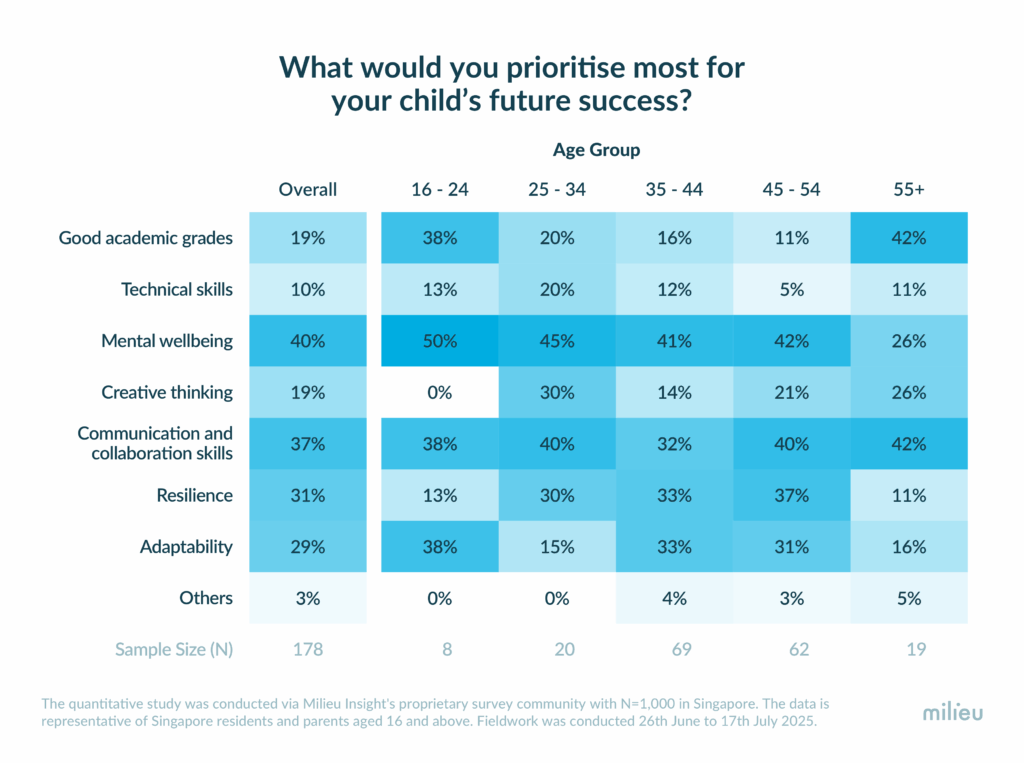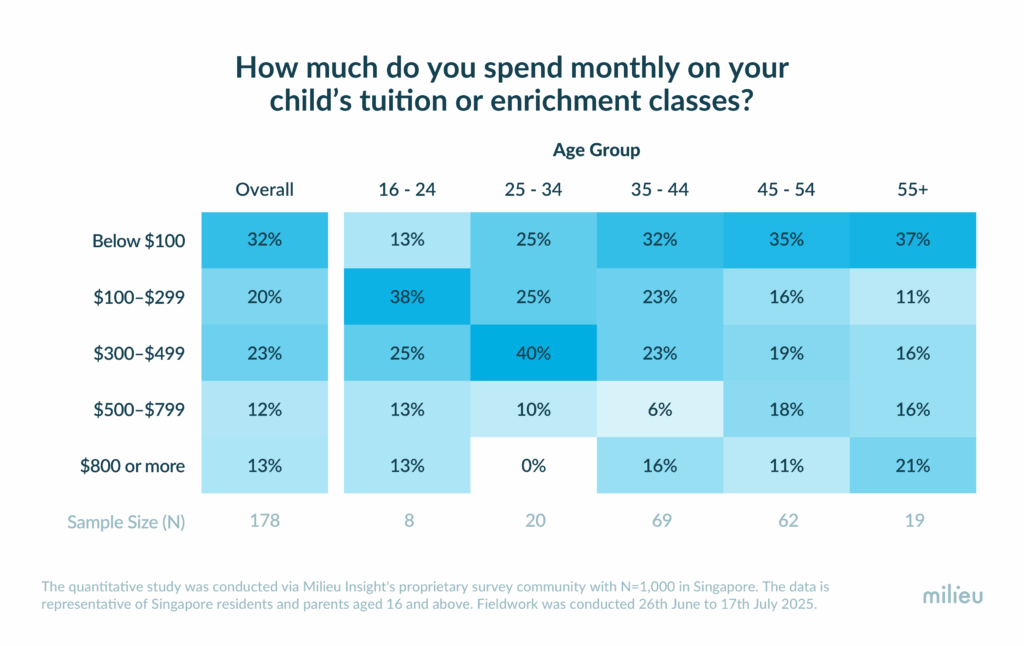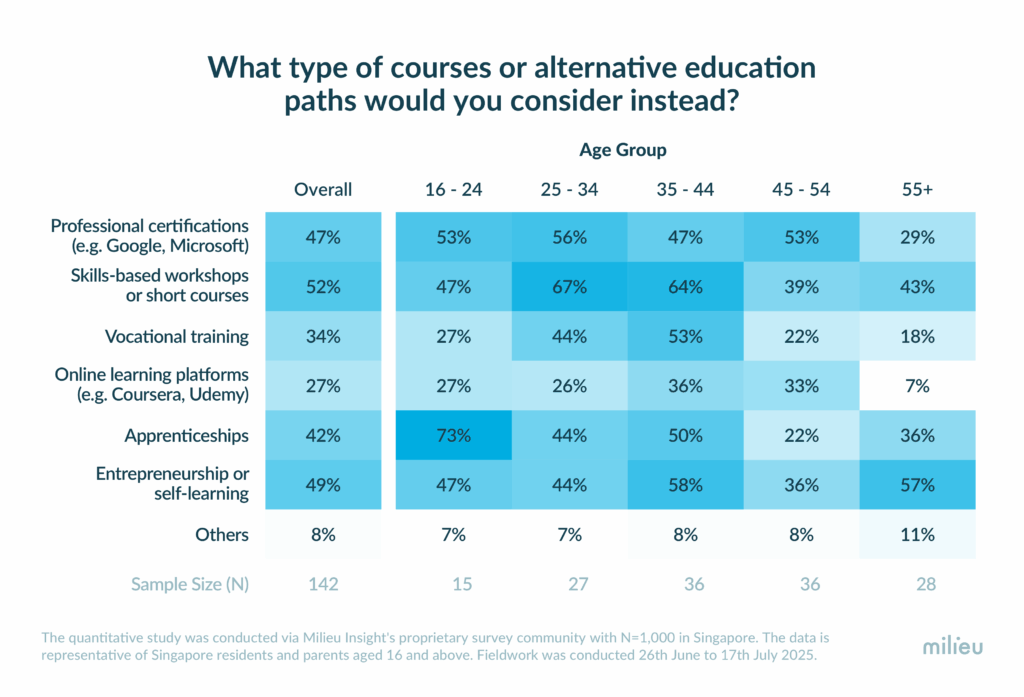A recent study by Milieu Insight has revealed a significant shift in how Singaporeans perceive the role and value of education.
While broad satisfaction with the education system remains strong, increasing attention is being placed on students’ mental health, the value of tuition, and the relevance of a university degree in today’s world.
The study, conducted between 26 June and 17 July 2025, surveyed 1,000 Singaporeans aged 16 to 55 and above. The data carries a margin of error of ±4 percentage points.

High satisfaction, but soft skills take centre stage
Overall, 73% of respondents expressed satisfaction with Singapore’s education system, and 63% agreed that it prepares students effectively for the real world. Support was highest among respondents aged 55 and above, suggesting long-standing confidence in the system.
Notably, 63% also felt that the system does well in teaching essential soft skills such as communication, teamwork, and critical thinking. This marks a growing r ecognition that these competencies are as crucial as academic knowledge in preparing students for life beyond school.
Tuition investments reflect cultural norms of academic effort
Parents aged 25 to 34 are making the most significant investments in tuition and enrichment activities for their children. Among this group:
- 50% reported their children spend between 4 and 6 hours weekly on such classes
- 40% spend between S$300 and S$499 monthly on tuition
However, this commitment appears to be contributing to stress, with 48% of parents across all age groups acknowledging their children experience significant academic pressure.
Despite these concerns, 71% of parents indicated their children have not been asked to stop tuition due to stress or fatigue, illustrating a prevailing cultural mindset that emphasises perseverance and academic rigour.

Shifting views on the necessity and impact of tuition
Despite heavy investments, only 40% of parents believe their child’s academic performance would decline if tuition were no longer available or affordable. This suggests a growing scepticism about the real efficacy of supplementary academic support.
When asked what is most important for their child’s future success, 40% prioritised mental well-being, followed by 37% who highlighted communication and collaboration skills. This reveals a more holistic definition of success gaining traction among Singaporean parents.
The university degree loses ground as a marker of success
The value of a university degree is also being questioned. Only 38% of Singaporeans consider it moderately important in today’s context, and many believe employers share this view.
Among degree holders, 74% cited better career opportunities as their primary motivation, while 68% pursued degrees for higher income potential. In contrast, those who placed less importance on degrees pointed to real-world experience as a more decisive factor, also at 68%.
Alternative education paths increasingly favoured
The study also explored views on alternative learning routes. Preferences varied by age group:
- 73% of respondents aged 16 to 24 supported apprenticeships
- Over 60% of those aged 25 to 44 preferred short, skills-based workshops
- 53% of those aged 45 to 54 leaned toward professional certifications
- 57% of respondents aged 55 and above expressed interest in entrepreneurship or self-learning
The popularity of these flexible paths reflects the growing appeal of non-traditional education that prioritises practical skills and self-direction.
This trend is also linked to the rise of unconventional career paths. Nearly 60% of respondents agreed that careers such as influencers, YouTubers, streamers, and TikTokers have made a bachelor’s degree appear less essential to achieving success in modern society.

Broadening definitions of success
Commenting on the findings, Juda Kanaprach of Milieu Insight noted, “The data paints a clear picture: while academic achievement and degrees still matter, Singaporeans are becoming increasingly mindful of soft skills, well-being, and alternative educational paths.” He added that the findings point to an evolving mindset that aligns education with the changing demands of the workforce and society.
The study underscores that the emphasis is no longer solely on grades or credentials, but on a broader set of qualities that equip individuals to thrive in diverse environments.
The post Singaporeans reconsider traditional academic routes as soft skills and mental well-being take priority appeared first on The Online Citizen.


